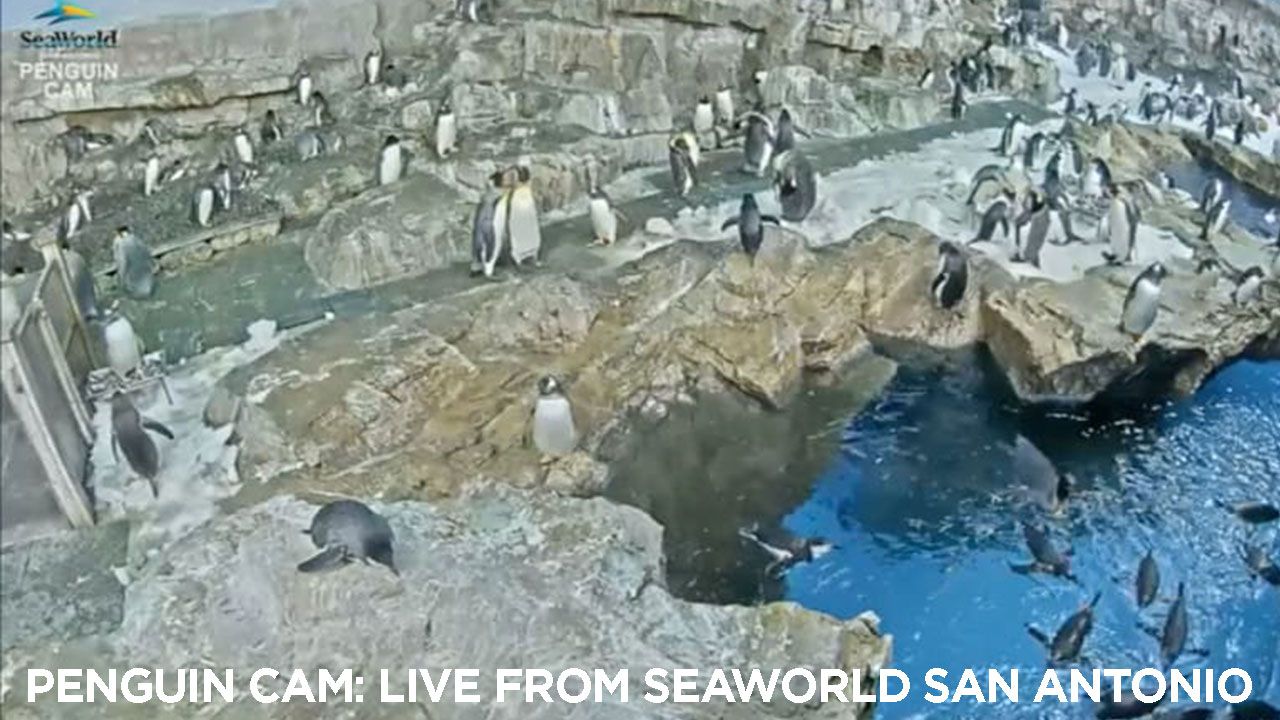What kind of food do penguins like to eat? Brrrrritos! Just kidding.
SeaWorld San Antonio and KSAT are teaming up to bring you what we all need this year – a little happiness. This time, by way of the Penguin Cam.
You now have 24/7 access to view the roughly 250 birds at SeaWorld San Antonio, which includes four species of penguins: king, Gentoo, chinstrap and southern rockhopper.
Watch anywhere, anytime on all of KSAT’s platforms: on our KSAT-TV page on KSAT.com, on our free streaming apps, on our KSAT Kids’ page or by bookmarking this article.
🐧 What can you expect to see on the Penguin Cam?
There’s lots of movement, “instead of sleeping for hours at a time like us, penguins take short, sporadic naps throughout the day and night. This adaptation allows the colony to be on constant alert for predators,” said aviculture staff at SeaWorld San Antonio.
And while you might notice that these flightless birds aren’t exactly agile on land, they’re incredibly fast underwater.
“They generally spend the majority of their lives in the water, so their bodies are perfectly adapted for swimming,” said aviculture staff members. “Some species can swim quite quickly; the gentoo penguin, for example, can reach speeds of up to 22 mph, which is as fast as the average cruise ship.”
You’ll get to see penguins eat as well – the penguins are fed throughout the day with as much fish as they feel like eating. Fish, like herring, capelin, night smelt, and silversides, are tossed in the water in the penguin enclosure and also served on trays in the snow.
“Each individual bird has its own unique personality, so their typical behaviors and activity levels will vary,” aviculture staff said. “Some penguins spend much of their time swimming, while others seem to prefer climbing on rocks and snow piles or hanging out with their caretakers.”
🐧 What’s the deal with the tuxedos?
Aviculture staff said there’s actually an important reason penguins look so formal – having a bright belly and dark back allows the birds to camouflage in the water.
“If a predator were to look down at a swimming penguin, the bird’s dark back would blend in with the seafloor; on the other hand, if the predator were to look up at the penguin, the bird’s bright belly would blend in with the sunlight shining at the surface,” according to the aviculture specialists. “This type of coloration is common in other marine animals too and is known as ‘counter-shading.’”
Some of the penguins have also been given names by caretakers and visitors with certain penguins having fans that come to visit them specifically “like Freckles the rockhopper penguin and Janet the king penguin.”
Every penguin at SeaWorld San Antonio has a special identifying number that allows caretakers to keep accurate health, breeding, and training records and “colorful bands placed around their wings correspond to those identification numbers.”
🐧 But, they’re in a cage…
Many people express concern over keeping animals in “cages” or just generally contained within four walls.
The Penguin Encounter at SeaWorld San Antonio isn’t just a special opportunity for people to meet penguins up close. The park participates in the Species Survival Plan (SSP), “a program to preserve selected species in zoos and aquariums, many of which are struggling in the wild.”
“In addition to SeaWorld’s in-park efforts, the nonprofit Sea World & Busch Gardens Conservation Fund has sponsored projects around the globe that are related to penguin rescue and conservation, such as the Falkland Islands Penguin Census,” said aviculture staff.
Even better? All 18 species of penguins are legally protected.
If you want to learn more about SeaWorld San Antonio’s penguins, you can meet a penguin up-close in a guided Penguin Tour, or chill in the habitat with the whole flock in the Penguin Interaction Program.
Grab a jacket though – it’s 35 degrees in the penguin enclosure.
Visit http://www.seaworld.org/ for more information.
Related:
KANGAROO CAM: Live look inside the tree kangaroo habitat at San Antonio Zoo
Do penguins sneeze? Yep, and here’s what it looks like
Poop scoop: Satellite images reveal Antarctic penguin haunts

